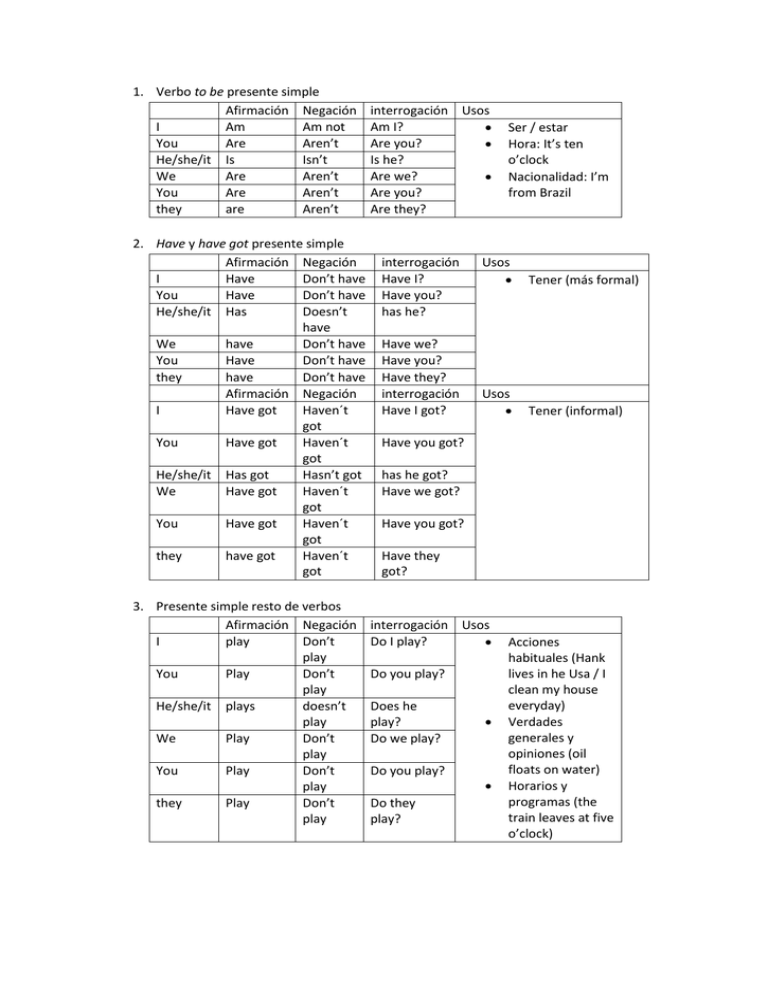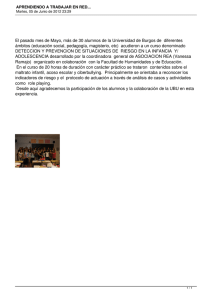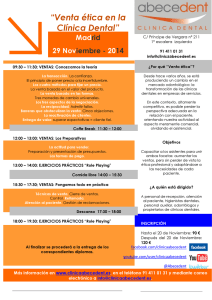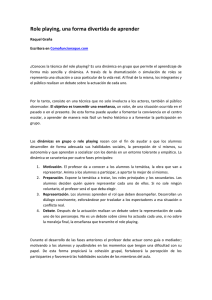1. Verbo to be presente simple Afirmación Negación interrogación
Anuncio

1. Verbo to be presente simple Afirmación Negación I Am Am not You Are Aren’t He/she/it Is Isn’t We Are Aren’t You Are Aren’t they are Aren’t 2. Have y have got presente simple Afirmación Negación I Have Don’t have You Have Don’t have He/she/it Has Doesn’t have We have Don’t have You Have Don’t have they have Don’t have Afirmación Negación I Have got Haven´t got You Have got Haven´t got He/she/it Has got Hasn’t got We Have got Haven´t got You Have got Haven´t got they have got Haven´t got 3. Presente simple resto de verbos Afirmación Negación I play Don’t play You Play Don’t play He/she/it plays doesn’t play We Play Don’t play You Play Don’t play they Play Don’t play interrogación Usos Am I? Are you? Is he? Are we? Are you? Are they? interrogación Have I? Have you? has he? Have we? Have you? Have they? interrogación Have I got? Ser / estar Hora: It’s ten o’clock Nacionalidad: I’m from Brazil Usos Tener (más formal) Usos Tener (informal) Have you got? has he got? Have we got? Have you got? Have they got? interrogación Usos Do I play? Do you play? Does he play? Do we play? Do you play? Do they play? Acciones habituales (Hank lives in he Usa / I clean my house everyday) Verdades generales y opiniones (oil floats on water) Horarios y programas (the train leaves at five o’clock) 4. Presente continuo Afirmación I Am playing You Are playing He/she/it Is playing We You they Are playing Are playing Are playing Negación Am not playing Aren’t playing Isn’t playing Aren’t playing Aren’t playing Aren’t playing interrogación Usos Am I playing? Are you playing? Is he playing? Are we playing? Are you playing? Are they playing? 5. Pasado simple Afirmación Negación interrogación Usos I Played Didn’t Did I play? play You Broke Didn’t Did you break break? He/she/it Went Didn’t go Did he go? We Singed Didn’t Did we sing? sing You Shot Didn’t Did you shoot shoot? they cried Didn’ cry Did they cry? 6. Pasado continuo Afirmación I Was Playing You Were Playing He/she/it Was Playing We Were Playing You Were Playing they Were Playing Negación Wasn’t Playing Weren’t Playing Wasn’t playing Weren’t Playing Weren’t Playing Weren’t Playing interrogación Usos Was I Playing? were you playing? Was he Playing? Were we Playing? Were you Playing? Were they Playing? Acciones que están pasando en este momento (I’m studying English) Futuro ya decidido muy probable (I’m going to the doctor tomorrow) Acciones incompletas que ocurren en la actualidad (They’re studying English) Acciones que comienzan y concluyen en el pasado (I went to England three years ago) Acción que interrumpe otra más larga (I called her while she was driving) Acciones que estaban ocurriendo en un momento del pasado (last night Isabel was looking for a chemist) Acción interrumpida (when I saw you I was going to the doctor) Acciones simultaneas (I was playing the guitar while your sister was singing. 7. Presente perfecto Afirmación I Have played You Have gone He/she/it Has cut We Have tried You Have learnt Have spoken they Negación Haven’t played Haven’t gone Hasn’t cut Haven’t tried Haven’t learnt Haven’t spoken 8. Presente perfecto continuo Afirmación Negación I Have been Haven’t playing been playing You Have been Haven’t playing been playing He/she/it Has been Hasn’t playing been playing We Have been Haven’t playing been playing You Have been Haven’t playing been playing they Have been Haven’t playing been playing interrogación Usos Have I played? Have you gone? Has he cut? Have you tried? Have you learnt? Have they spoken? interrogación Usos Have I been playing? Have you been playing? Has he been playing? Have we been playing? Have you been playing? Have they been playing? Acciones pasadas que aunque ya terminaron guardan relación con el presente (I have read that book and it’s good) Acciones que comenzaron en el pasado pero continua en el presente (I have lived in Madrid for ten years) Acción que comienza en el pasado y sigue en curso (I have been watching TV all morning) Acción terminada pero con efectos sobre el presente (They are very tired because they have been playing in the playground) 9. Futuro con will Afirmación Negación interrogación Usos I Will start Won’t Will I climb? navigate You Will study Won’t Will you take jump a shower? He/she/it Will eat Won’t Will he paint dance? We Will listen Won’t Will we open dream? You Will bring Won’t Will you buy cook? they Willl skate Won’t Will they wake up scream? 10. Futuro con going to Afirmación Negación interrogación Usos I Am going Am not Am I going to to row going to show? turn on You Are going Aren’t Are you to bring going to going to steal shine? He/she/it Is going to Isn’t Is he going to forgive going to dig? scare me We Are going Aren’t Are we going to freeze going to to dive? skip a question You Are going Aren’t Are you to try going to going to ride a grow? bike they Are going Aren’t Are they to wear going to going to hurt fit me? Acciones futuras sin la intención del que habla (It will rain tonight) Predicciones y cosas que asumimos que van a pasar (I think Sue will arrive in Paris at six o’clock) Acciones planeadas para el futuro (We’re going to sing at the party) Algo que sabes que va a ocurrir en el futuro (Look! It’s going to rain) 11. Futuro perfecto Afirmación Negación interrogación Usos I Will have Won’t Will I have heard have forgoten? spelt You Are going Won’t Will you to have have have driven? brought swam He/she/it Is going to Won’t Will he have have split have tried taken We Are going Won’t Will we have to have have run? run thought You Will have Won’t Will you swept have have found? written they Are going Won’t Are they to have have going to sworn learnt have known? Algo ocurrirá antes de un tiempo específico o que acontezca otra acción (Today it will have rained before ten o’clock)


